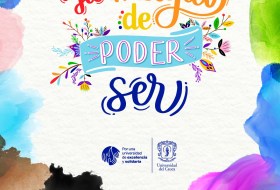News
"The Magic of Being Able To Be": The University of Cauca dresses in colors and joy for the dignity of #PrideMonth.
The LGBTIQ+ and diverse population commemorates pride and the struggles it has fought for the right to existence during the month of June. The University of Cauca joins the commemoration with the campaign 'The Magic of Being Able To Be,' recognizing different initiatives that have paved the way in the fight and defense of the rights of sexual and gender dissidences.
As a space that should contribute to social, cultural transformation, and the construction of peace in the territories, the University acknowledges the richness that diversity engenders, as well as the contributions made by various initiatives driven by individuals associated with the university and others in social engagement. These initiatives contribute to broadening perspectives and allow us to progress towards the recognition, respect, and defense of the rights of sexual and gender dissidences. Hence, we commemorate and launch an educational campaign called 'The Magic of Being Able To Be.'
To familiarize with the theme and the reasons behind this commemoration, it is essential to understand the origins and what led to the birth of what now makes June a month with special significance worldwide. The commemoration of Pride Month traces back to the events of June 28, 1969, at the LGBTIQ+ bar known as Stonewall Inn in New York City. Police conducted a raid to arrest individuals violating local laws, such as dressing in clothes not corresponding to their gender or selling alcohol to homosexuals. Clashes between the LGBTIQ+ community and the police lasted four days, leading to the formation of LGBTIQ+ rights organizations and the initiation of activism and equality movements. June 28 became the day to commemorate their struggle and claim the right to existence.
In Colombia, a significant milestone in recognizing their struggle was the year 1981 when homosexuality was decriminalized. The following year, Bogotá witnessed the first Pride March, co-founded by the academic and LGBTIQ+ rights activist León Zuleta and sociologist Manuel Velandia, the first openly homosexual person recognized as a victim by the Victims Law, marking a historic moment.
The role of civil society and social movements in the fight for LGBTIQ+ rights before the decriminalization of homosexuality in Colombia is noteworthy. In 1977, León Zuleta created the magazine 'El Otro,' providing a communication space for gay men and lesbian women. Two years later, Zuleta created a newspaper with the same name, calling for interested parties to form the Homosexual Liberation Movement in Colombia, a call answered by sociologist Manuel Velandia.
In Popayán, local LGBTIQ+ activism began in the 1970s with Érika del Río Sánchez Guevara, who challenged the heteronormative system and became the first trans woman in Popayán. However, other transgender, homosexual, and lesbian individuals were pushed into clandestine spaces, ironically the only places that guaranteed their right to life, though not in ideal conditions.
Another significant date in this struggle was May 17, 1990, when the World Health Organization declared homosexuality not a mental illness. The recognition of diversity impacted the fundamental rights of LGBTIQ+ individuals, such as the right to life and education, especially in a country with strong religious influence and conservative views like Colombia. Members of the LGBTIQ+ community, particularly from middle and lower social classes, were often ostracized from their families and forced into sex work or, in the best cases, into hairdressing.
The University of Cauca recognizes its historical debt to the LGBTIQ+ and diverse community. Through Superior Agreement 086 of 2021, it established the Institutional Policy for Inclusive Higher Education. Additionally, through Superior Agreement 005 of 2023, it implemented the Protocol for the Prevention and Attention of Gender-Based Violence (GBV) and Sexual Violence. Inspired by the global, national, and local struggles of the LGBTIQ+ community, the University is beginning to think about inclusive spaces, actions, and awareness activities, free from discrimination, to promote respect for differences and provide a safe space for sexual and gender dissidences. As a venerable institution approaching its bicentennial, the University recognizes its role in societal transformation and advocates for dialogue to achieve social, political, economic, and cultural transformation in the region.
The University expresses gratitude to individuals who paved the way in defending the rights of the LGBTIQ+ population. It also highlights and acknowledges the work of various organizations, collectives, and individuals, both within the University and locally, such as Transaliades, María Cano Gender Collective, La Revuelta Collective, Viraje Collective, Culturas Diversas Corporation, Aquelarre Feminist Design Laboratory, Transfeminist Furia Marica Collective, Mariposas Negras Collective, Eres Foundation, the Gender and Sexual Diversities Program of our University, and others, who engage in activism for LGBTIQ+ rights in various capacities.
In conclusion, during Pride Month, the University of Cauca is carrying out the commemorative campaign 'The Magic of Being Able To Be,' recognizing the relentless struggle of the LGBTIQ+ and diverse population for their rights. In this final week of June, we invite you to stay tuned to our social media and Unicauca Estéreo Radio as we have created content to delve deeper into this important topic. Through these actions, we specifically emphasize that our university is a space for analysis and reflection, aiming to provide the best conditions to recognize and highlight the value of diversity—a place where, always with respect, one can be everything they want to be.


